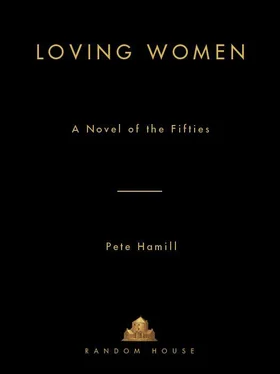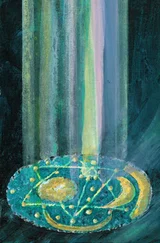So even before Coincoin died, The People had begun to buy the land on the Isle Brevelle. They built houses of mud held together with deer hair or Spanish moss. They turned their profits into more land and more slaves, always telling Coincoin what they were doing, and listening for her approval .
And by the time Coincoin died, The People owned twelve thousand acres and more than a hundred slaves .
They knew they couldn’t exist on their Isle without fresh blood. But that too brought them up against the sin of pride. You see, they wouldn’t mate with blacks: they didn’t want to darken their skins again. Blackness, nothing more, had made them the property of strangers. So they wanted to be lighter and lighter. That made it all right to mate with white men. Or with men and women like themselves, part African, part European. But never with pure blacks, for that would be to go back. So they had to go looking. The young men traveled into New Orleans and saw there the beautiful women at the octoroon balls, parading their beauty for the rich young whites in hopes of finding lifelong protection. But not many octoroon beauties came to Isle Brevelle, because they too were part of The People, and would only mate with whites. The young men of New Orleans were something else, those poor lost men with mixed blood; nobody would set them up in houses, as white men did for their quadroon beauties. So some of the men came upriver to marry the women of Isle Brevelle. They had no money, no property other than their bodies and blood. But they were needed, and they came .
The Isle grew fat and rich. The land was turned to cotton and corn, the cotton sold in New Orleans, the corn for cash in Natchitoches. By 1840, The People owned the richest plantations in the parish, owned more slaves than the white men. King Cotton made The People rich. It allowed them to loan money to white planters, and invite them over to the mansions that had replaced the mud huts. It brought tutors from New Orleans to teach their children. It built a Catholic church where whites came to pray. It brought silk stockings and perfume and bands to play waltzes .
But cotton also came from oxen and mules and niggers .
I wonder now what happened sometimes in the evenings, when the masters walked out on their porches while the orchestras played. They could see in the distance the mud huts of the slave quarters. Did they hear forbidden drums playing? Did they hear Africa coming across the lawns?
You pay for your sins. You know that, child. You’re a Catholic too. Like The People were. Like me. Pride goeth before a fall. Right? And that’s what The People carry around with them to this day. The Story of the Fall .
It came in waves. The first was natural: there was only so much land, and when people died, they divided it among their children so that all the plots got smaller and harder to make money from. The Americans came. All of them Protestants, bony men with cold eyes. At first The People tried to ignore them, sticking to the old ways, speaking French and Spanish (the old language gone now), remaining Catholics as the Protestant tide flowed around them. They couldn’t believe that these pitiful river rats would forever replace the men of Europe. Paris was a thousand years old and Madrid was older. Washington was a village .
But the Americans kept filling the surrounding lands, then running the banks and businesses and imposing a harder, more heartless attitude about color. Some of The People tried to befriend the Americans. They invited them to their homes, they loaned them money .
But the Americans saw The People in a different way. Instead of marveling at what we had made with sweat and sacrifice, they envied it. And after a while they wanted to take it from The People without working for it as Coincoin and her sons had, plows strapped to their shoulders, hunting bear in the dark woods. So the Americans began to challenge the land grants given by the kings of France and Spain, scheming and cheating and calling upon God as their primary witness. They exhausted us in courtrooms. They sat down to play cards with our men, not for a few reales as in the old days, but for entire plantations. And sometimes they won: leaving families without land, and more women and children to be taken in by The People, further dividing the limited acres .
So when the cotton market collapsed, and the Depression came, and the banks failed and the whole country was full of starving people, the Americans were waiting like vultures. All the cotton planters, white and colored, lived on credit, taking money from the banks at the beginning of the season that was paid back at harvest time. But the Depression went on and on for almost ten years. Everywhere, land, slaves, and tools were taken away to pay the debts, everybody thinking: This is just for now, soon the Depression will end and we can go back and do what we always did. Our young men were still told to walk straight and proud. The People still worshiped each Sunday in the church on Isle Brevelle where half the parishioners were white. There were still parties and marriages and love affairs. But the Americans were chopping away at us .
So was God .
For then one spring the Cane flooded and destroyed half the crops and a horde of caterpillars came behind it and ate the rest. The budworms came the following year, and then the price of cotton collapsed again all over the world. The banks failed. Again the Americans grabbed what they could of the good land cleared and made abundant by The People. It was as if the great sin of pride had brought down the full punishing wrath of God .
And so when the last act of the tragedy began, they didn’t see it for what it was. The Civil War. The War Between the States. That was it, the final blow. And The People showed that they were no different in the end from other human beings. It was simple. They owned slaves. So they sided with the Confederacy .
And when the war bounced off the North and drove back deeper into the South and the Confederates retreated, The People helped. The Confederates destroyed much of what had been built by The People and their slaves. And then the Union army arrived, chasing the rebels, and destroying the rest. They raped our women. They tortured our men. For one long weekend there was no night in the land as everything from Natchitoches to Isle Brevelle was set to the Yankee torch. They called us niggers. And then they moved on. Talking about freedom .
Isle Brevelle never recovered. The slaves were gone, looking for the Promised Land, and The People had no money to hire new help. Crops rotted. Land went fallow. Families moved into the slave quarters, squatting on dirt floors, sleeping against mud and deer-hair walls. Reconstruction ended and the Americans made clear that all their talk of freedom was a lie. And The People learned permanently what they should have known from the beginning: to the white man, they would always be niggers .
Some stayed along the Cane. Most drifted moved on. My folks went to New Orleans. For a long time after the war, The People were still allowed to live there. I mean, really live. Not live the way the white man wanted you to live. But free. Marrying who you want. Eating where you want. That didn’t last long. The rednecks took the South. They used their damn Bible to keep people down, to make them feel inferior, denying them even simple education and honest work, denying them freedom. They made sure you knew that no damn Yankee ever won a war .
So here I am, child. You sittin there with your eyes wide open and your chin droppin. Sittin here with me. How’s it feel to know the damn Klan could do to me any minute what it did to Bobby Bolden? More: How’s it feel to know you been in love for a long time now with a nigger?
Читать дальше












